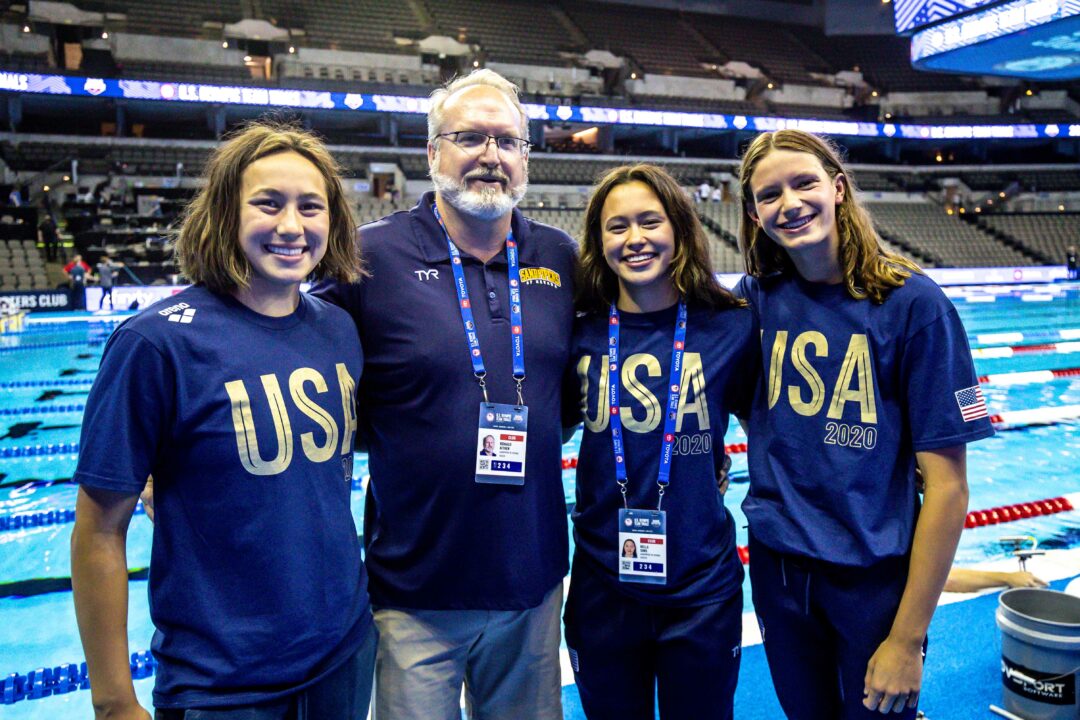In the SwimSwam Podcast dive deeper into the sport you love with insider conversations about swimming. Hosted by Coleman Hodges, Garrett McCaffrey, and Gold Medal Mel Stewart, SwimSwam welcomes both the biggest names in swimming that you already know, and rising stars that you need to get to know, as we break down the past, present, and future of aquatic sports.
SWIMSWAM PODCAST LINKS
- Click here to listen and subscribe on Spotify
- Click here to listen and subscribe on Apple Podcasts
- Click here to listen and subscribe on Podbean
- Click here to listen and subscribe on Google
- Click here to listen and subscribe on YouTube
- Click here to listen and subscribe on Listen Notes
- Click here to listen and subscribe on Stitcher
- Click here to listen and subscribe on iHeartRadio
- Click here to listen and subscribe on Amazon
- Click here to listen and subscribe on Pandora
Music: Otis McDonald
www.otismacmusic.com
RECENT EPISODES
Opinions, beliefs and viewpoints of the interviewed guests do not necessarily reflect the opinions, beliefs, and viewpoints of the hosts, SwimSwam Partners, LLC and/or SwimSwam advertising partners.

The key to high volume training is whether the swimmer can withstand it, especially as they get older, and by that I mean being able to recover from one practice to the next. Some people are not able to recover from one practice to the next, and then they can end up in a downward spiral, which is counterproductive. But if the swimmer can recover, then you have a great distance swimmer on your hands. In my experience, some swimmers have an innate ability to recover quickly. By the way, IMO, 70K/week is pretty standard training for a world-class distance swimmer, and even for world-class middle-distance swimmers. In the 70’s and 80’s it was not unusual for distance swimmers to… Read more »
Another huge asset of Ron’s program is that it capitalizes on the benefit of year round altitude training for distance swimmers. Does anyone know the science of how long you maintain that benefit once you start training at sea level for an extended period?
We maxed out at 24,000 a week in the summer all long course meters in 1977
I’m sorry a day
70K a week. Par with the course in Salnikov’s era 3500K a year https://www.fina.org/news/1909139/swimming-then-now-a-conversation-with-vladimir-salnikov-rus
Seems ridiculous.
70,000meter week /12, 000mtr/day, preparing for a 15minute/1500event.
Would seem a posterchild of training inefficiency.
Moronic comment
could it be any more obvious you didn’t watch the interview? he goes in depth about the kind of quality sets they do, it was very interesting.
Also, I wonder what kind of training most commenters on this website grew up with? I wasn’t from some kind of high-volume program, but 70k in a week would be on the high end of normal. when I read 70k in the week, my thought was that it was interesting and informative that they go basically to almost full training load, not that this was some kind of insane distance.
The reality is that if you want a 4km high quality set, the practice as a whole is going to be… Read more »
In high school, I swam HS only. We had a young coach, but he came from a very “old coach” background and mentality. During Christmas break, we’d peak at about 10k/day, 6 days/week, +drylands, for HS only. So anybody who was also doing club was doing well over 70k/week. This includes sprinters.
U18 swimming in Texas, and especially Houston, in the early 2000s was not very innovative, and I think it showed with Texas being surpassed in the quality of athlete they were producing. There were still lots of very, very good swimmers coming out of the state, but not nearly as many world-class swimmers coming out of the state at the time.
Brendan, how many years ago did you do that?? Do you think the methodology of training has evolved from that??
Reading these comments make me believe that some are somehow stuck in that era.
All I can say is anyone who has watched these girls train..you will instantly know they love what they are doing. They have a great dynamic (coach and athletes) And we always talk about coaching is knowing what works best for your athletes, and we are so focused on all race pace training being the end all be all..that when a coach does high yardage the majority of comments are negative because most perceive it’s not ideal for all involved. He CLEARLY knows what works, the girls enjoy doing his process, and the outcome is positive for all involved.
also Coleman-great interview!
Such a thoughtful coach, and great interview. I think a lot of club coaches push volume without a purpose. And Ron’s purpose is setting his program apart.
Smart guy